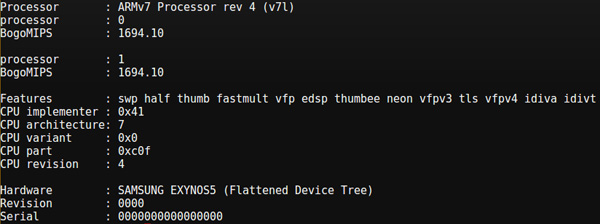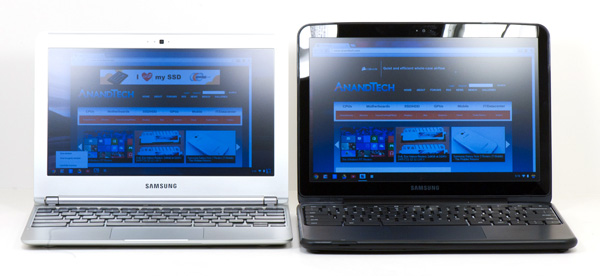Samsung Chromebook (XE303) Review: Testing ARM's Cortex A15
by Anand Lal Shimpi on October 31, 2012 9:00 AM ESTPerformance: Atom vs. ARM's Cortex A15
In our iPhone 5 review I included this crude diagram comparing the high level micro-architecture layouts of the current crop of mobile CPU cores. While most of the cores looked fairly similar, the one to really stand out is ARM's Cortex A15. A three issue, OoO core, the Cortex A15 was designed to put ARM in a completely new performance category.

For 2013, the Cortex A15 is expected to be the ARM CPU core of choice for the next wave of smartphone and tablet SoCs. NVIDIA's Wayne should integrate multiple Cortex A15s as well as competing solutions from Samsung and TI. Samsung's Exynos 5 Dual, found in the new Chromebook, integrates two ARM Cortex A15 cores running at 1.7GHz. As our first experience with a Cortex A15, I wanted to get a good idea for how it would compare to Intel's Atom. And now me comparing to the older Chromebook 500 makes sense. The Atom N570 in the older Chromebook is the closest approximation we have to the currently shipping Atom based mobile SoCs. There are a number of enhancements to the newer chips (particularly when it comes to power consumption), but the base core is very similar. It's clear that the Sandy Bridge Celeron based Chromebook is faster than this new Cortex A15 design, but how about the old dual-core Atom model?

As Chrome OS is built around the Chrome browser, our tests had to be largely JavaScript based unfortunately. The good news is that even given the nature of the benchmarks, we're able to get a good feel for performance between the two SoC platforms. Both systems were running the latest version of Chrome OS at the time of publishing.
| Samsung Chromebook Performance Comparison | ||||||
| SunSpider 0.9.1 | BrowserMark | RIABench Focus Tests | Kraken | |||
| Atom N570 1.66GHz | 1034.3 ms | 152780 | 1968 ms | 14229.5 ms | ||
| Exynos 5 Dual 1.7GHz | 690.5 ms | 217031 | 1192 ms | 9733.2 ms | ||
The Cortex A15 is fast. Across the board we're seeing a 40 - 65% increase in performance over a dual-core Atom. Although it's not clear how performance will be impacted as companies work to stick Cortex A15 based SoCs in smartphones with tighter power/thermal budgets, in notebooks (and perhaps even tablets) the Cortex A15 looks capable of delivering a good 1 - 2 generation boost over Intel's original Atom core.
The IE10 browser tests tend to agree with our JavaScript performance tests, although the CSS Maze Solver benchmark shows a huge advantage for ARM over Intel's Atom here.
| Samsung Chromebook Performance Comparison | ||||||
| IE10 Bubbles Test | IE10 Fishbowl | IE10 Maze Solver | ||||
| Atom N570 1.66GHz | 11 fps | 5 fps | 45 seconds | |||
| Exynos 5 Dual 1.7GHz | 17 fps | 8 fps | 17 seconds | |||
GPU performance is an even bigger advantage for the Exynos 5 Dual over Intel's old Atom N570 (GMA-3150 GPU). I ran three different webGL tests, each of which showed just how bad the old Atom GPU core was.
| Samsung Chromebook GPU Performance Comparison | ||||||
| WebGL Solar System | WebGL Cubes (500) | WebGL Aquarium (50) | ||||
| Atom N570 1.66GHz | 2 fps | 10 fps | 2 fps | |||
| Exynos 5 Dual 1.7GHz | 22 fps | 28 fps | 38 fps | |||
This comparison isn't really all that fair as the newer Atom cores use Imagination GPUs, although even then they are using relatively underpowered solutions compared to what Samsung is shipping on the Exynos 5 Dual.
The more relevant conclusions here apply to the CPU comparison. Next year Intel is expected to introduce its first new Atom core since the platform's introduction five years ago. The new architecture will bring an Out of Order execution core as well as a tangible performance increase. The question is whether or not this will be enough to fend off advances from Cortex A15 based designs.

The new Chromebook (left) vs. the old Atom based Chromebook (right)
In our Surface review I looked at Clovertrail Windows 8 tablet performance and put it a good 40%+ faster than NVIDIA's Tegra 3. If ARM's Cortex A15 is able to outperform Clovertrail by a similar margin, it could make the next generation of Windows RT tablets even more attractive. Keep in mind that we're looking at an older Atom platform here and not Clovertrail, so the performance deltas could shrink a bit.











149 Comments
View All Comments
jeffkro - Friday, November 2, 2012 - link
You do realize there is a higher end chromebook that runs on a ULV celeron cpu right. If you want better specs it is available.jeffkro - Friday, November 2, 2012 - link
The celeron runs windows pretty fast so you know its lighting fast for chrome OS.agnar150 - Saturday, November 3, 2012 - link
You could not be more wrong. The OS structure is inherently more secure and it is very much more secure than Windows.Wolfpup - Friday, November 2, 2012 - link
How is Windows not safe? I've been using it how long now? Decades? And had exactly zero security intrusions. Being the market leader so you're a big target doesn't mean the platform is less safe-in fact Microsoft takes security a lot more seriously than most closed source software does.As for this unit...it remains ridiculous. I bought a $200 Acer running real Windows 7 on AMD hardware, and it's obviously a bajillion times more functional. This thing runs one single program-Chrome, on low end hardware, doesn't properly support external displays or other devices, can't replace my real PC for...much of anything, and it actually costs as much or more than superior devices...just like the older Chromebooks did.
epobirs - Friday, November 2, 2012 - link
Utter nonsense. There are tons of options for locking down Windows the average consumer doesn't bother with but the information is widely available. Just a few changes makes it far harder for malware to get any value from the machine.The difference is that you still have the full capabilities of Windows and its software library, along with a choice of browsers, including Google Chrome.
The people I know who do serious online financial work wouldn't blink at spending a lot more than $250 to pay someone like me to teach them to lock down their machine for work. Putting up with the limitations of Chrome OS and paying for the privilege would strike them as absurd.
UltraTech79 - Friday, November 16, 2012 - link
"People that do online investing and banking with significant assets" have better options than shitty chrome OS or standard windows. Ridiculous.ddriver - Wednesday, January 9, 2013 - link
Have you actually checked the chrome store? there are plenty of good applications, especially concerning productivity, surely, the overall number of apps is much lower than android, but considering most of those are useless, it is not that big of a deal. You can do plenty of stuff on the chromebook, and that that price point it is a very good bargain.Flunk - Wednesday, October 31, 2012 - link
No, honestly it doesn't. If you need a keyboard you buy one of the ASUS Transformer pads. This is a very limited device that won't get you very far and really doesn't have a reason for existing. If this was just a laptop-like device running android I could see the utility but Chrome OS is basically just a kneecapped version of android.jeffkro - Wednesday, October 31, 2012 - link
Its kneecapped for security, their is a reason for it.klmccaughey - Thursday, November 1, 2012 - link
I would totally agree with this if there was an android with a keyboard and this hardware at this price point. The transformer is good, but it's far too expensive.I got an Ipad 2 by accident, and between that and the laptop I don't think I need anything else. I hate Apple, which makes the whole experience confusing.